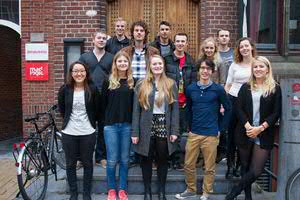Oriëntatietraject Noord-Nederland voor studiekiezers van start
Deze week gaat het nieuwe Oriëntatietraject Noord-Nederland van start met de eerste 13 deelnemers. Het oriëntatietraject is bedoeld voor aankomend studenten die grote moeite hebben met het kiezen van een studie. Zij volgen een intensief programma, gericht op het maken van een studiekeuze.

Het Oriëntatietraject is een initiatief van de decanenkring Groningen, in het bijzonder het Augustinuscollege en het Gomaruscollege, in samenwerking met de Rijksuniversiteit Groningen en de Hanzehogeschool. Aankomende studenten die moeite hebben met hun studiekeuze, ontwikkelen een beter beeld van zichzelf en van wat ze kunnen en willen. Ook doen ze onderwijs- en arbeidservaring op. Zo kunnen ze een bewuste studiekeuze maken. Het traject duurt drie maanden. De gemiddelde belasting is twee dagen per week, zodat de deelnemers daarnaast bijvoorbeeld kunnen werken. De eerste groep bestaat uit 13 personen, uit de noordelijke provincies. In januari 2015 gaat een nieuwe groep van start.
Veel invulling vanuit de praktijk
De deelnemers doen interesse- en persoonlijkheidstesten en leren antwoord vinden op de vraag ‘Wat wil ik en wat kan ik?’. Maar ze leren bijvoorbeeld ook plannen, budgetteren en presenteren, en er is veel aandacht voor beroepen. ‘Voor het opdoen van arbeidservaring werken we nauw samen met het Ondernemerstrefpunt (OTP),’ vertelt Cato van der Vlugt, coördinator van het oriëntatietraject. ‘Dat is nuttig voor beroepsoriëntatie en stages. Trainingen laten we verzorgen door schooldecanen en door studenten Psychologie en Toegepaste Psychologie. Daarnaast is er een theaterdocent en komen er geregeld gastsprekers. En studenten gaan veel op pad, bijvoorbeeld voor bedrijfsbezoeken en meeloopdagen.’
Diverse achtergronden
De meeste deelnemers aan het traject zijn leerlingen die deze zomer hun havo- of vwo-diploma hebben behaald. Een van hen is Marthe Huisman. ‘Ik heb geen idee wat ik zou moeten kiezen. Er is niet echt een bepaald gebied dat me heel erg aanspreekt, en ik weet ook niet of ik hbo of universiteit wil doen. Anders zou ik nu zijn gaan reizen of zo, maar het lijkt me ideaal om eerst dit te volgen. Ik wil nu bezig gaan met mijn vaardigheden en interesses vóór ik weg ga. Het geeft structuur, is een intensief programma, en je ontmoet mensen die in dezelfde situatie zitten. Dat stimuleert denk ik erg.’
Niet alleen schoolverlaters kunnen bij het oriëntatietraject terecht. Er is bijvoorbeeld ook een afgestudeerde van de pabo bij en twee studenten die zijn gestopt met de studie. ‘In januari starten we met een nieuwe groep,’ vertelt Van der Vlugt. We verwachten dat er dan nog meer heroriënteerders bij zitten.’
Oriëntatieprogramma’s succesvol
Veel scholieren hebben moeite met het maken van een studiekeuze. Uit onderzoek blijkt dat zij veel baat hebben bij langlopende oriëntatieprogramma’s. Die bevindingen worden ondersteund door ervaringen elders. Bij soortgelijke trajecten zijn de ervaringen positief: tachtig procent van de deelnemers blijft bij de gemaakte keuze.
